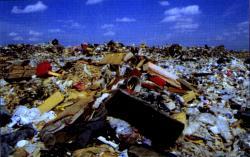CERN's New Particle Accelerator Promises Window on Big Bang
Published:
25 July 2004 y., Sunday
Scientists probing something as big as the origins of the universe sometimes need equipment to match. At the European nuclear research center CERN in Geneva, they're building the most powerful particle accelerator ever. The Large Hadron Collider, as it's called, is expected be able to recreate the conditions that existed at the time of the Big Bang, when the universe was born. Scientists say they hope the new tool will help them unravel the mysteries of matter and energy, and confirm or demolish existing theories.
Contrary to what its name implies, the Big Bang was not necessarily an explosion. Scientists consider the Big Bang to be more of a marker to note that the universe had a beginning. It is the moment in which the universe, space and time were created. CERN Physicist Richard Jacobsson says scientists do not know why or how the Big Bang occurred. But big particle accelerators such as the Large Hadron Collider help them to understand the process.
When the Large Hadron Collider (LHC) is completed in 2007, the superconducting magnets in the machine will operate at 271 degrees, just above absolute zero. However, Mr. Jacobsson says that the temperature created in the proton-proton collisions will be one billion times hotter than at the center of the sun.
Some 6,500 scientists from more than 80 countries currently collaborate on hundreds of ongoing experiments at CERN. The world's biggest particle physics laboratory is celebrating its 50th anniversary this year.
Šaltinis:
voanews.com
Copying, publishing, announcing any information from the News.lt portal without written permission of News.lt editorial office is prohibited.
The most popular articles

The European Commission announced today the award of three of the six contracts for the procurement of Galileo’s initial operational capability.
more »
 The British survey team was dropped onto the floating ice of the Arctic Ocean to begin a three month trek to the North Pole.
more »
The British survey team was dropped onto the floating ice of the Arctic Ocean to begin a three month trek to the North Pole.
more »
 There was embarrassment for NASA on Tuesday following the loss of a 278 million dollar climate satellite.
more »
There was embarrassment for NASA on Tuesday following the loss of a 278 million dollar climate satellite.
more »
 The nearly complete skeleton of a massive Colombian mammoth has been dug out of a construction site in downtown Los Angeles.
more »
The nearly complete skeleton of a massive Colombian mammoth has been dug out of a construction site in downtown Los Angeles.
more »
 A solar power station on the French island of Réunion and a centre for aeronautical research in the Belgian region of Wallonia fetched two of the EU’s annual awards for best regional projects.
more »
A solar power station on the French island of Réunion and a centre for aeronautical research in the Belgian region of Wallonia fetched two of the EU’s annual awards for best regional projects.
more »
 Archaeologists on the side of the Step Pyramid of Saqqara found an Egyptian sarcophagus more than two and a half thousand years old.
more »
Archaeologists on the side of the Step Pyramid of Saqqara found an Egyptian sarcophagus more than two and a half thousand years old.
more »
 Many children living in slums in the eastern Indian state Jharkhand are so poor that they have pick through garbage to earn extra money for their families.
more »
Many children living in slums in the eastern Indian state Jharkhand are so poor that they have pick through garbage to earn extra money for their families.
more »
 Only 1% of Europe is untouched by humans and everything must be done to preserve what is still out there for the future.
more »
Only 1% of Europe is untouched by humans and everything must be done to preserve what is still out there for the future.
more »
 Europe is catching up with its main economic rivals – the US and Japan – in innovation performance, according to an EU study.
more »
Europe is catching up with its main economic rivals – the US and Japan – in innovation performance, according to an EU study.
more »
 The modern world puts emphasis on better use of knowledge and rapid innovation.
more »
The modern world puts emphasis on better use of knowledge and rapid innovation.
more »
 The city and university have been at a stalemate over the Venezuela Highway construction project which was started last year and is slated to go right through the middle of the school.
more »
The city and university have been at a stalemate over the Venezuela Highway construction project which was started last year and is slated to go right through the middle of the school.
more »